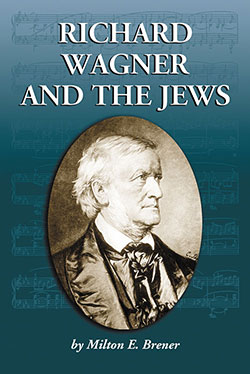Richard Wagner and the Jews
$39.95
In stock
About the Book
It is well known that Richard Wagner, the renowned and controversial 19th century composer, exhibited intense anti–Semitism. The evidence is everywhere in his writings as well as in conversations his second wife recorded in her diaries. In his infamous essay “Judaism in Music,” Wagner forever cemented his unpleasant reputation with his assertion that Jews were incapable of either creating or appreciating great art.
Wagner’s close ties with many talented Jews, then, are surprising. Most writers have dismissed these connections as cynical manipulations and rank hypocrisy. Examination of the original sources, however, reveals something different: unmistakeable, undeniable empathy and friendship between Wagner and the Jews in his life. Indeed, the composer had warm relationships with numerous individual Jews. Two of them resided frequently over extended periods in his home. One of these, the rabbi’s son Hermann Levi, conducted Wagner’s final opera—Parsifal, based on Christian legend—at Wagner’s request; no one, Wagner declared, understood his work so well. Even in death his Jewish friends were by his side; two were among his twelve pallbearers.
The contradictions between Wagner’s antipathy toward the amorphous entity “The Jews” and his genuine friendships with individual Jews are the subject of this book. Drawing on extensive sources in both German and English, including Wagner’s autobiography and diary and the diaries of his second wife, this comprehensive treatment of Wagner’s anti–Semitism is the first to place it in perspective with his life and work. Included in the text are portions of unpublished letters exchanged between Wagner and Hermann Levi. Altogether, the book reveals astonishing complexities in a man long known as much for his prejudice as for his epic contributions to opera.
About the Author(s)
Bibliographic Details
Milton E. Brener
Format: softcover (6 x 9)
Pages: 343
Bibliographic Info: photos, notes, bibliography, index
Copyright Date: 2006
pISBN: 978-0-7864-2370-5
eISBN: 978-0-7864-9138-4
Imprint: McFarland
Table of Contents
Acknowledgments x
Preface 1
A Note on Translation 5
Part I. Zurich
1. The Asyl 9
2. The Fugitive 18
3. Minna 23
4. The Paris Jews 32
5. The Essay 38
6. Tausig 50
Part II. Paris and Vienna
7. The Break with Minna 61
8. Tristan und Isolde 67
9. Tannhäuser in Paris 71
10. Vienna 77
11. Penury 80
12. Biebrich on the Rhine 86
13. The Vienna Jews 89
14. Flight from Creditors 96
Part III. Munich
15. King Ludwig 105
16. Cosima 108
17. The First Tristan 117
18. Exile from Munich 125
Part IV. Lucerne
19. Triebschen 133
20. Die Meistersinger 142
21. Cosima’s Diaries 146
22. “Judaism in Music”: The Second Publication 150
23. Das Rheingold Brouhaha 156
24. The Turn of Die Walküre 162
25. Wagner and the French 166
26. Death of Tausig 171
Part V. Bayreuth I: The First Festival
27. Rubinstein and Preparations for The Ring 181
28. The Scapegoats 189
29. The First Festival 194
30. Neumann 202
Part VI. Bayreuth II: Levi and Neumann
31. The Young Hermann Levi 213
32. The Brahms-Levi Friendship 221
33. The Breach with Brahms 226
34. A Study in Malice 232
35. Declining Health, Worsening Temperament 236
36. The Strangest Synagogue 241
37. Distance from Porges, Closeness to Rubinstein 246
38. Neumann and the Berlin Ring 256
39. Neumann and the Traveling Wagner Opera Company 262
Part VII. Bayreuth III: The Second Festival
40. Levi and Parsifal 269
41. Lichtenberg and the Knieses 275
42. Wagnerphobia 286
43. Glimpses of the Other Side 292
44. The Final Days 297
Appendix: “Judaism in Music” 301
Chapter Notes 317
References 323
Index 327
Book Reviews & Awards
- “A fine resource…recommended”—Choice
- “Brener…is a writer to be reckoned with…splendid book, deeply considered, well written, and rich in detail”—Southern Humanities Review
- “An account of permanent value…forthright”—Annals Australasia
- “Of permanent value”—Reference Reviews





